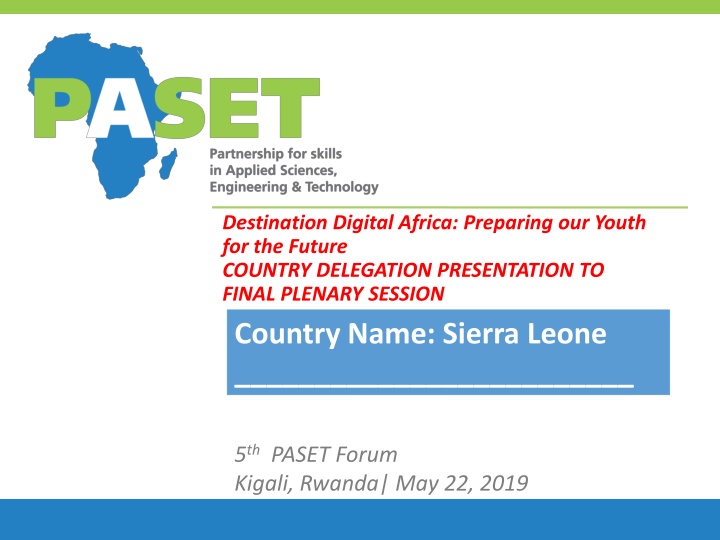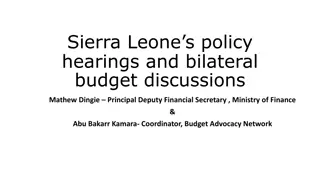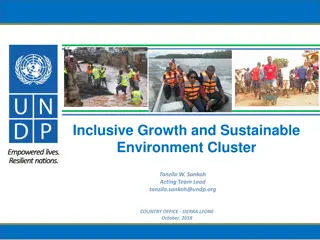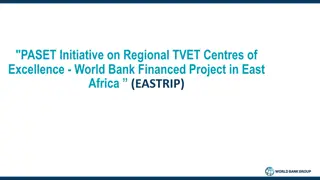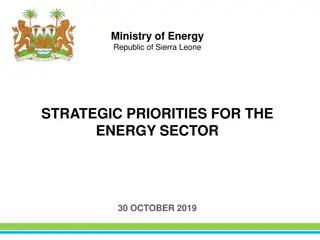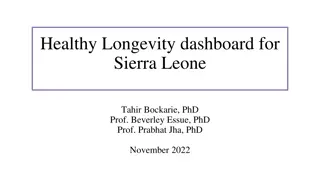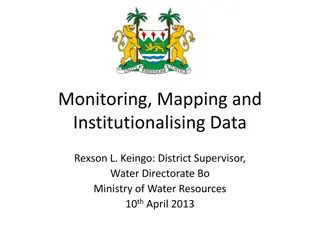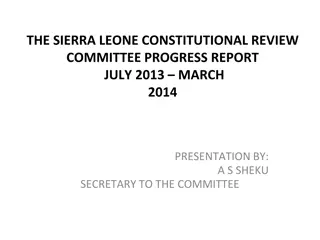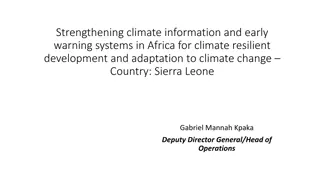Preparing Sierra Leone's Youth for the Digital Future: Insights from PASET Forum
Changes in higher education and TVET courses in Sierra Leone are being discussed to align with the Fourth Industrial Revolution and digital economy. The country plans to introduce new teaching methodologies, incorporate technology in course delivery, and enhance digital skills in key sectors. Collaboration with public and private sectors, as well as focusing on ICT connectivity and capacity building, are key strategies highlighted at the forum.
Download Presentation

Please find below an Image/Link to download the presentation.
The content on the website is provided AS IS for your information and personal use only. It may not be sold, licensed, or shared on other websites without obtaining consent from the author.If you encounter any issues during the download, it is possible that the publisher has removed the file from their server.
You are allowed to download the files provided on this website for personal or commercial use, subject to the condition that they are used lawfully. All files are the property of their respective owners.
The content on the website is provided AS IS for your information and personal use only. It may not be sold, licensed, or shared on other websites without obtaining consent from the author.
E N D
Presentation Transcript
Destination Digital Africa: Preparing our Youth for the Future COUNTRY DELEGATION PRESENTATION TO FINAL PLENARY SESSION Country Name: Sierra Leone _________________________ 5thPASET Forum Kigali, Rwanda| May 22, 2019
Changes in Higher Education and TVET courses to prepare for the Fourth Industrial Revolution and Digital Economy You have heard about the changes that need to be introduced in the courses taught in higher education/ TVET, about the need to teach non-cognitive skills, use new teaching methodologies such as project based learning. We intend to introduce courses that use case studies and problem style approach Introduce technology in the delivery of the courses for real time feedback Introduce advance digital skills in key sectors such as agriculture, mining and developing ICT applications for teaching and learning. Review curriculum to accommodate new courses that are job related and and introduce a one year internship for third year students to gain practical skills on course. We will encourage Public Private Partnership . Employers across sectors will be involved in the review of the curriculum. They will provide information on needs in their sectors , which will be integrated to courses for students. 2
Is there any approach/ experience of another country that you have learnt during this Forum that will benefit you? What kind of capacity building is required? Ghana and Kenya reduced the cost of internet and improved internet connectivity this in turn improved access and usage to the internet. India approach- the government set up the structure and collaborated with Step up to bridge the gap between learning and earning. Capacity building requirement for instructors will include information communication technologies, marketing platforms, physical and biological techniques etc. You have heard about the need to improve ICT connectivity for Higher Education and TVET systems, to bring down costs and improve availability of content We will collaborate with the EU to tap on the Africa Connect Project for internet coverage to our Universities and TVET institutions or coordinate with mobile operators to offer discount to student data plans 3
ICT Connectivity for Higher Education and TVET Systems What have you learned during the Forum that you could adapt to your country? The success of the 4th Industrial revolution hinges on access to affordable internet connection. The involvement of private sector in the demand and supply chain for a digitalise economy. The integration of ICT in the curriculum for universities and TVET institutions Government should focus on areas with high potential for technology to prepare youths for jobs. We want to develop a Management Information System in the Ministry of Technical and Higher Education. The MIS will serve as a centralised information system for TVET/Universities to access admission data, staff profile, assessment, courses offered and other relevant information. 4
Using Technology to Transform Higher Education and TVET How would you incentivize and help teachers / faculty to adopt technologies? Provide capacity building training for teachers on the use of digital skills, computers/tablets and encourage the use of on-line resources as lecture notes. Evaluation/assessment of log ins, feedbacks, comments and views of users will helps us assess whether technology is helping to improve student learning. There is need to comply with standard technical specifications identified by professional ICT Personnel to improve procurement of technologies. We will need capacity building training for instructors on the use of advanced technologies in field of education, health, agriculture, engineering, mining and tourism as well as provision of equipment in the fields identified 5
Planning ahead What government policies or regulations need to change in order to enable higher education/ TVET institutions to be better prepared, better connected, and able to deploy technology? Be as specific as possible Review legal and regulatory framework in a year to accommodate changes that will nurture skills relevant to the changing environment for ICT Develop supporting legislation through case studies from other countries The inclusion of public and private industry in the review of curriculum for TVET and Higher Education institution The operationalization of the Sierra Leone Research Network Introduce basic digital skills for primary and secondary schools. Improve on institutional networking Provide opportunities and resources for investment in STEM 6
The most critical investments are 1. Establishing the legal and regulatory framework for TVET/ Universities 2. Provision of stable energy to public TVET/Universities. 3. Access to affordable internet services in our educational institutions 3. Deployment of equipment 4. Capacity building/Research How would you go about preparing a costed action plan, with prioritized investments to improve university and TVET courses, improving connectivity, and using technology in education? Establish infrastructures to support Technology in public educational institutions Improve research facilities in universities and TVET institution Create the enabling environment to encourage online courses that are job related for our population. Establish a national e-libraries for students. 7
We will need to work with the Ministry of Youth, agriculture, Labour, Trade, and Industry, Works, Mineral Resources, Basic and Senior Secondary Education , Tourism, information and Communication. We improve knowledge sharing between countries by organising an annual meeting to share knowledge on progress made from actions on previous meeting and discuss recommendations for improvement and lessons from best practice across the world. We will monitor progress in implementation through the submission of Annual Progress Report to the PASET Secretariat. 8
